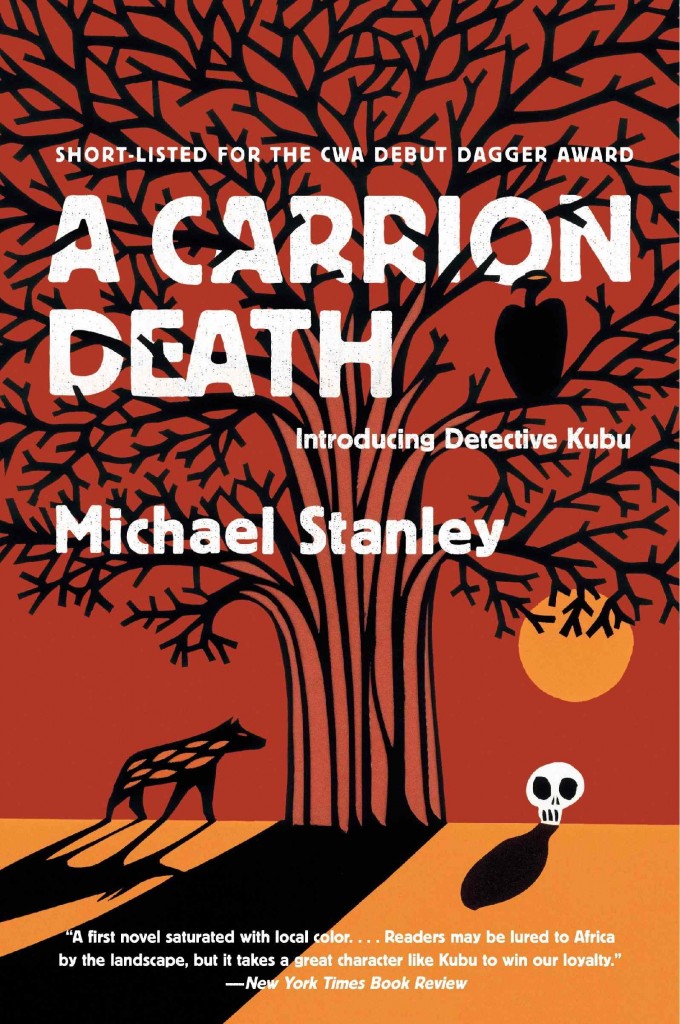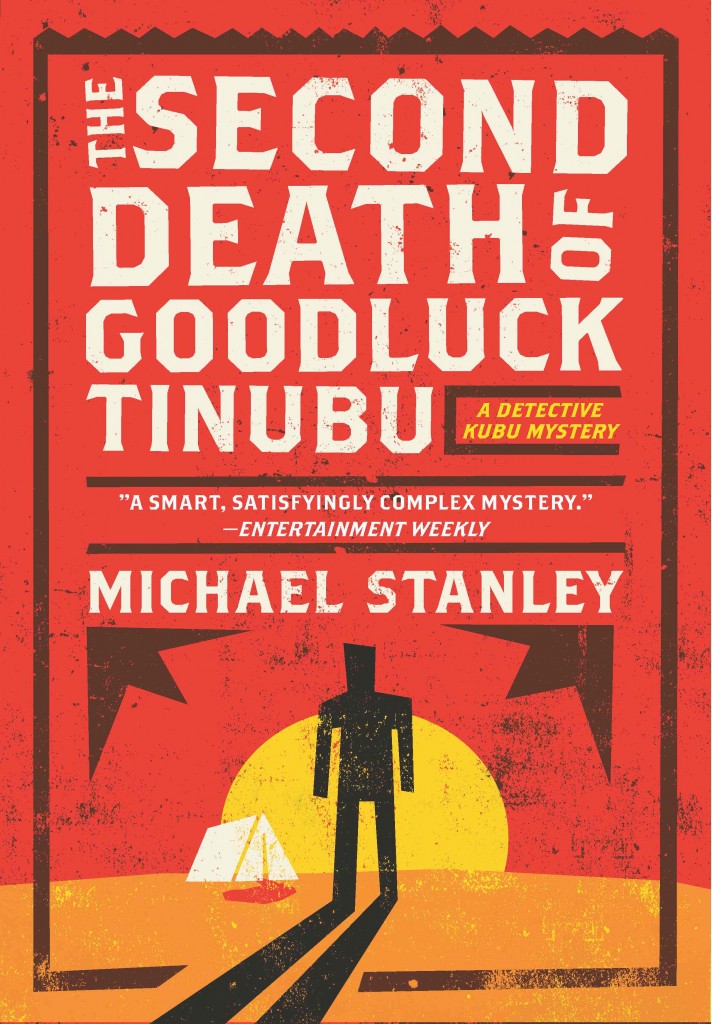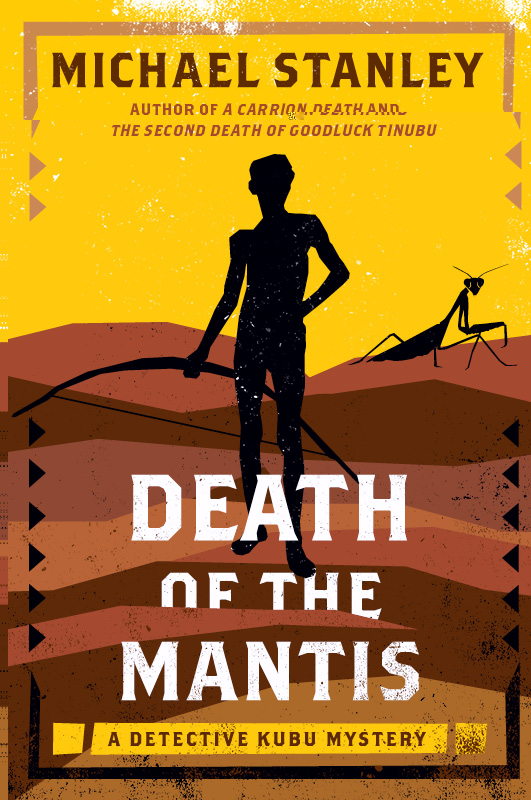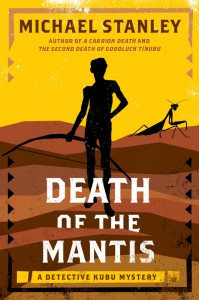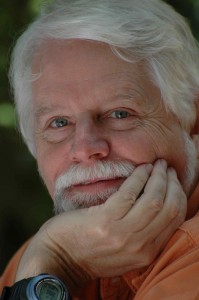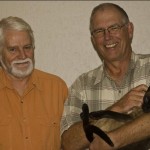Oh, you thought that my last post contained my last word on book promotion for first-time authors? Have you been listening to the siren song of the Literature Fairy again?
“Don’t bother to learn anything about how books are actually sold,” she croons into the willing ears of both the about-to-be- and hope-someday-to-be-published alike. “That’s not going to be your job, sugar; your publisher will handle all of that. You’re the author: your only job is to write a terrific book. And if it’s good enough, not only will it inevitably get published; it will inevitably attract thousands of readers.”
Those guffaws you hear bouncing off the rafters, campers, are coming from everyone who has successfully promoted a book written by a non-celebrity within the last five years. Yes, one of the standard advantages of pursuing traditional publishing does indeed lie in having one’s work promoted by a marketing department, but it’s now quite rare that even major publishers do not expect first-time authors to get out there and sell some books. And not merely, as the vast majority of first-time authors expect, by showing up at book signings and interviews set up by the publisher. Increasingly, publishers expect their authors to market their own books independently as well.
Don’t bat those big reindeer eyes at me; I’m not responsible for this sea change. As the literary market has gotten tighter — and as Internet sales have eaten up a greater share of that market — more and more of the burden of reaching potential readers has been shifted to the author.
Which, let’s face it, almost always comes as a gigantic surprise to the happy few getting published for the first time. What savvy self-published writers already know — that the author is the single best advocate for a book — those new to traditional publishing are often stunned to discover is part of their job at all, let alone something that their publishers will expect them to do on an ongoing basis.
Oh, should I have told you to sit down first? Book promotion is not like tag: an author can’t just take one slap out it and then be home free. Even if a writer plans to publish only one book ever — not the usual goal of those who want to make a living at it — reaching and establishing a readership not only takes time up front; a readership also requires maintenance.
Again with the reindeer eyes? What’s upsetting you now? “But Anne,” writers everywhere moan, “I’m a writer, not a marketer! I would have no idea where to start. The most I’d been envisioning was smilingly acknowledging an enthusiastic mob of literature lovers crowding around me at a bookstore, clamoring for me to sign copies of my book. Well, okay, if I’m going to be completely honest about it, I’d also been picturing an interviewer deeply familiar with and impressed by my writing asking me how I got started. I’ve been practicing my answer to that since I was 8 years old!”
That’s charming — make sure to include that last bit in an interview when you’re famous. But the fact is, what most aspiring writers have in mind as authorial book promotion is what well-established and/or celebrity authors do: show up, be gracious, and wax poetic about their craft to those who are already demonstrably interested in their work.
An author trying to attract an audience for a first book seldom enjoys that luxury: as so many books come out in any given year, the simple fact that a work appears within covers does not necessarily attract attention from the reading public at large. (Except, of course, that portion of the reading public that already happens to know and adore you.) Nor, contrary to popular opinion, will just slapping up a website for your book automatically translate into potential readers visiting it. Before readers can flock to your book signings or frequent your website, you’re going to need to flag ‘em down and alert them to the fact that your first book exists.
You’re going to need, in short, to learn to play the publishing world’s reindeer games. At least a little. At least, if you would like your book to sell.
Or you could always become a celebrity between now and when the book comes out, someone whose very name causes people’s heads to snap around and brings the media running. Do let me know how that works out for you.
On the perhaps unwarranted presumption that at least a few of you fine people will be bringing out your books without the advantage of an already-established platform, over the next few months, I’m going to be talking about some authorial promotion strategies. For the moment, though, let’s begin with easy steps. First, I’d like you to get used to the idea that no matter how talented you are — and no matter how often you’ve heard otherwise from followers of the Literature Fairy — if you want your book to be a commercial success, you are going to have to invest some significant effort in letting your target audience know why they will enjoy it so much.
I can feel some of you squirm. I know, I know: commercial success is not the only, or usually the best, measure of a good book. And it’s not at all unusual for a traditionally-published first novel, especially if it’s literary fiction, to sell only a couple of thousand copies. (To put that in perspective, the average self-published book sells about 500 copies, without the help of a publisher’s marketing department.)
I also know that for many, if not most, aspiring writers, the dream of seeing one’s own work in print is far greater in scope and range than the mere desire to make some money from it. That would be nice, too, of course, but the goal here is communication, right?
I’m sympathetic to that view — honestly, I am. But you want people to read your work, right?
In the literary world as it is currently constituted, that means you are going to have to sell some books. Think about it: someone purchased even the copies that end up in public libraries, right? So are the volumes people lend and give to one another. And frankly, everyone who works with books for a living is aware of that; no one, but no one, in the publishing world will think any the less of you as an artist if you exhibit some serious interest in getting out there and pushing some copies.
In fact, quite the opposite. You’d be amazed by how many small-scale authors became big-selling ones by pushing their early works, sometimes one volume at a time. (I’m looking at you, Garth Stein.)
Getting inspired yet? Good. Let’s start brainstorming about what you might say to potential readers — or, as our guest last time described so intriguingly, to managers of small bookstores — in order to encourage them to take a chance on a terrific new book.
To that laudable end, I’d like to encourage you to ponder a question that surprisingly often does not occur to first-time authors: what is special about your book?
No matter how big you make your eyes, you’re going to have to answer that question eventually, Blitzen. Yes, it may be beautifully written, but what else does it offer the reader that no other book currently on the market — say, released within the last five years — offers habitual readers in your chosen book category?
Hands up if your first reaction to that question was defensive. That’s pretty common, I’m sorry to report: instead of hey, tell me what’s great about your book, writers new to the reindeer games frequently hear what makes you think it’s good enough to sell?
But that’s not in fact what this quite standard question is asking. It’s aimed at what any reader will want to know before picking up your baby and considering it for purchase: why will that reader — a reader, lest we forget, who already habitually buys books in your chosen book category — absolutely love this book?
That’s a perfectly reasonable question, Rudolph. Or did you think that mentioning that you were the only reindeer on Santa’s sleigh sporting a red nose would not interest the reader of your memoir, DO NOT BUMP INTO THE CHIMNEY WHEN YOU LAND?
Yet you’d be amazed at how often first-time authors walk into interviews, signings, and other promotional occasions without a ready answer to this obvious question. Indeed, as any regular attendee of bookstore readings could attest, many authors often seem not to have thought about the issue at all. Which is interesting, because knowing not just that a book is good, but why a book is good is indispensable to promoting it well.
Call me zany, but as an interviewer, I tend to zero in on a book’s high points. Admittedly, not all interviewers have the time or the inclination to read a book before interviewing its author (yes, really), so it’s a good idea for an author to be prepared to give both an intriguing description of the book’s premise and some indication of why readers of similar books will like it. (And no, Virginia, because it’s like the books you already read is not a sufficient answer to the latter. In theory, that response could apply equally well to any book in your chosen category, right?)
Yet you’d be flabbergasted how few authors seem to be able to produce either in a pinch — or even to be able to respond well to an interviewer who has read the book’s gushing about its strengths. Those of you who attend book readings and read or see author interviews are already aware of that, right? Too many authors evidently think it’s becoming to act as though an introducer or an interviewer is bringing up a book’s strengths is simply bestowing praise — and what is praise for but to be enjoyed?
Um, sorry, Dasher, but if the person introducing you to potential readers has even the vaguest idea of what she is doing, she’s not saying those things to make you happy. She’s saying them to encourage readers to pick up your book. Wouldn’t it be more becoming, then, as well as substantially better book promotion, if you responded to these overtures as invitations to discuss the book in a manner that might appeal to those readers?
Oh, you hadn’t thought of it that way? Neither had most first-time authors before some kind soul in a marketing department read them the riot act about a lackluster personal appearance. Since I’m fairly confident that we’ve all seen examples of authors lapping up praise like water — and, understandably, as the well-deserved reward of many years of literary struggle — I’d like to show you an example of an author dealing with this type of interview question well. If only for its novelty.
Once again, please join me in welcoming longtime member of the Author! Author! community D. Andrew McChesney, author of the recently-released naval fantasy, Beyond the Ocean’s Edge, available now from Outskirts Press, as well as in e-book form for Kindle and for Nook. For those of you joining us in mid-interview, here’s the blurb:
Is it possible to sail beyond the ocean’s edge to another world? In 1802, Royal Navy Lieutenant Edward Pierce is ashore on half-pay because of the Peace of Amiens. He fortunately gains command of a vessel searching for a lost, legendary island. When the island is found, Pierce and his shipmates discover that it exists in an entirely different but similar world. Exploring the seas around Stone Island, HMS Island Expedition sails headlong into an arena of mistaken identities, violent naval battles, strange truces, dangerous liaisons, international intrigue, superstition, and ancient prophecies.
Now, as an interviewer, I could just have grilled Dave about what is evident in this blurb: this is an action-packed naval adventure, set in a fantasy world. That would have set him up nicely to talk about how his book would appeal to naval adventure and fantasy readers, right? However, since I had read the book — and enjoyed it, by the way — before we filmed this, I went straight to what I feel is a genuinely unusual strength of this novel: the highly realistic feel and meticulous historical detail of the narrative. See how well prepared Dave was to explain those strengths to potential readers.
See what he did there? Dave’s first response to my mentioning his great use of detail was not to blush, or to respond to it as a question about craft — which, while it might interest other writers, might not be a grabber for habitual readers of naval adventure who don’t also write — but to name several other books similar to his. Right away, that establishes his target audience. And then, without sacrificing one whit of authorial charm or humility, he immediately makes it clear to his potential readers that he is an expert in his book’s subject matter.
Well-played reindeer game, sir!
Food for thought, isn’t it, future book promoters? Give some thought to what makes your book special — and the next time you’re daydreaming about being interviewed like a celebrity author, take a swing at coming up with a stellar answer or two of your own. Keep up the good work!


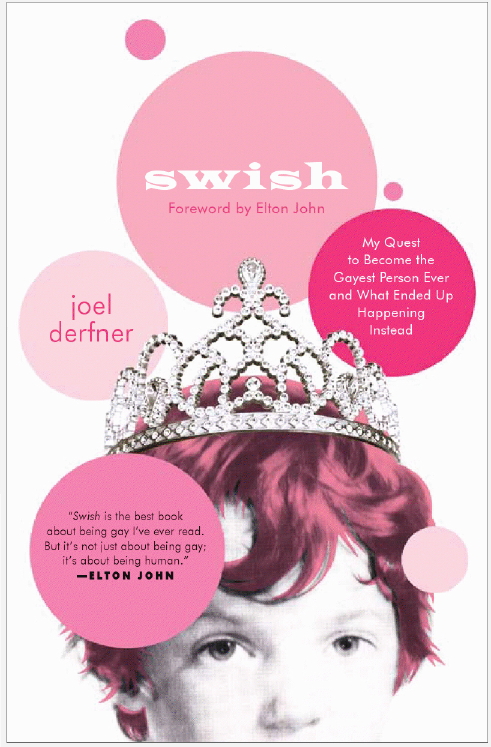
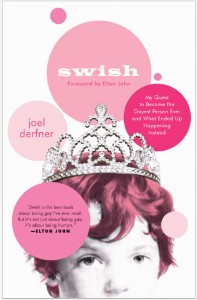


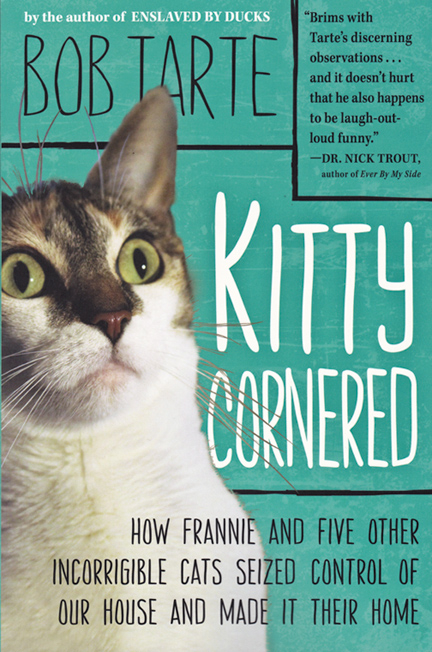
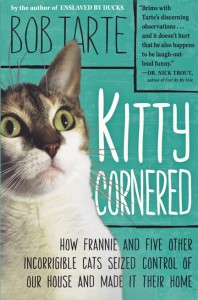

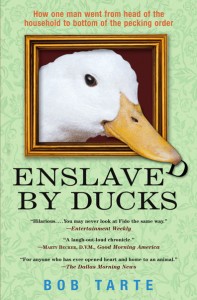 When Bob Tarte left the city of Grand Rapids, Michigan for the country, he was thinking peace and quiet. He’d write his music reviews in the solitude of his rural home on the outskirts of everything.
When Bob Tarte left the city of Grand Rapids, Michigan for the country, he was thinking peace and quiet. He’d write his music reviews in the solitude of his rural home on the outskirts of everything. Bob Tarte’s second book, Fowl Weather, returns us to the Michigan house where pandemonium is the governing principle, and where 39 animals rule the roost. But as things seem to spiral out of control, as his parents age and his mother’s grasp on reality loosens as she battles Alzheimer’s disease, Bob unexpectedly finds support from the gaggle of animals around him. They provide, in their irrational fashion, models for how to live.
Bob Tarte’s second book, Fowl Weather, returns us to the Michigan house where pandemonium is the governing principle, and where 39 animals rule the roost. But as things seem to spiral out of control, as his parents age and his mother’s grasp on reality loosens as she battles Alzheimer’s disease, Bob unexpectedly finds support from the gaggle of animals around him. They provide, in their irrational fashion, models for how to live.
